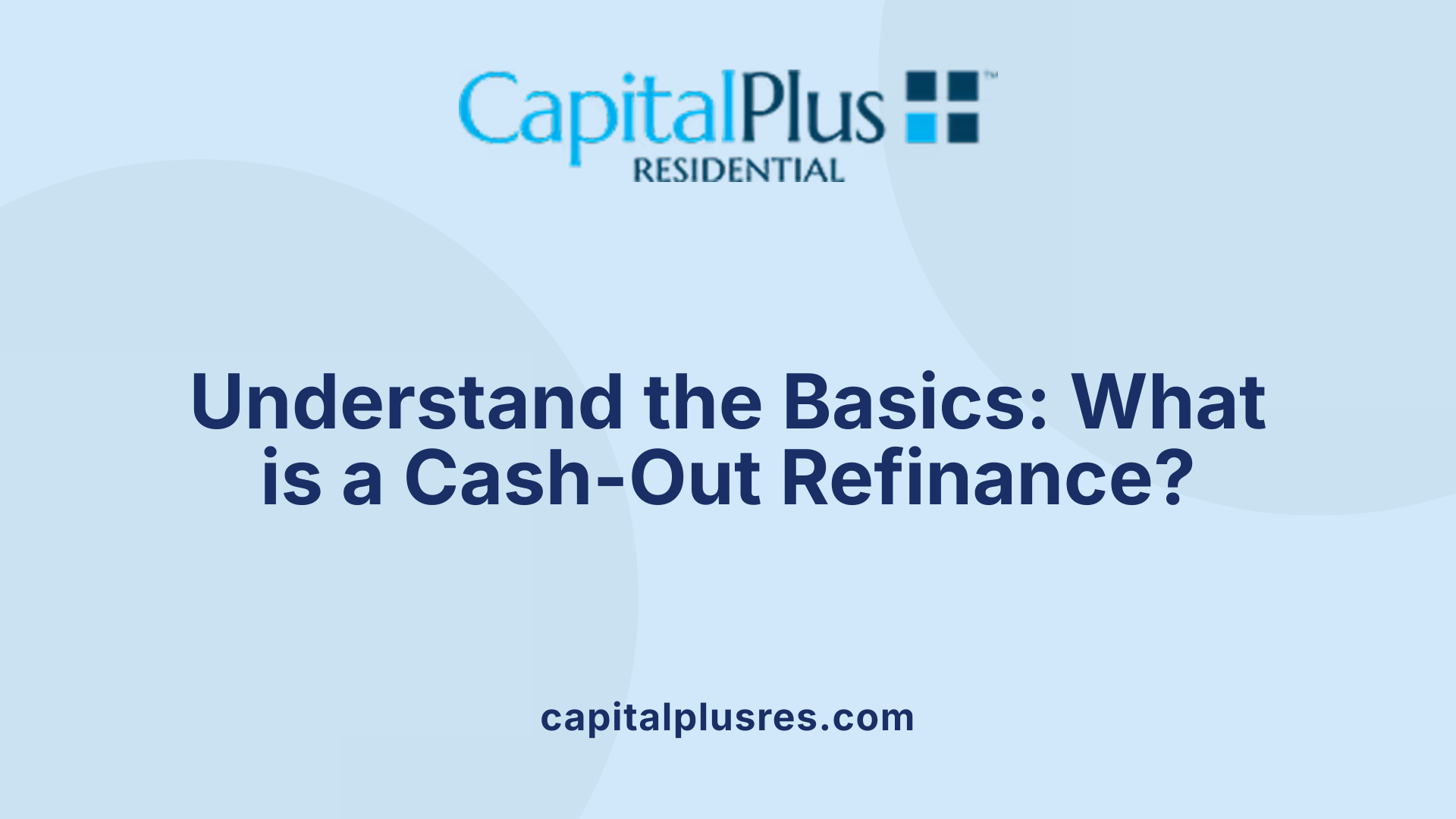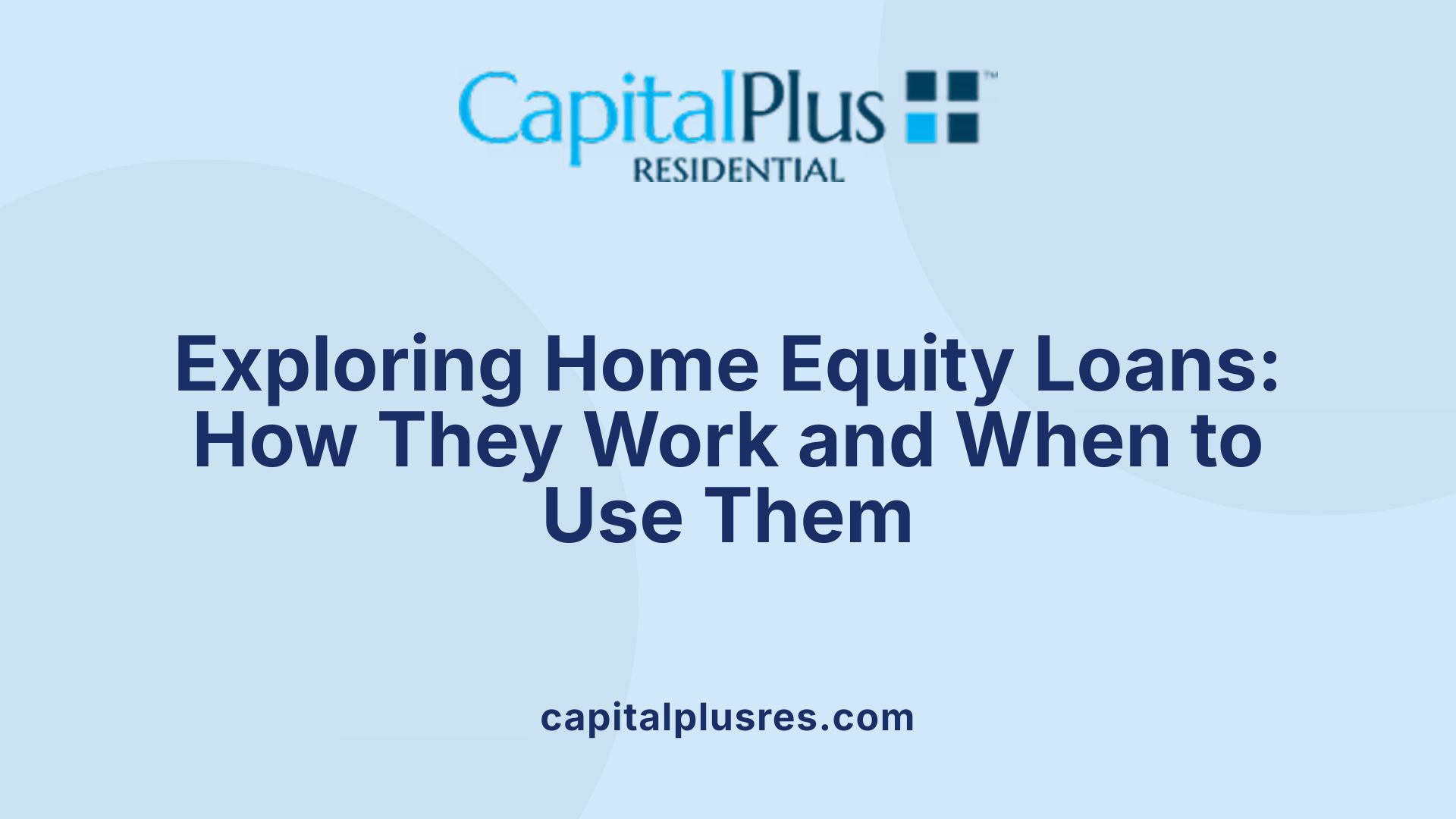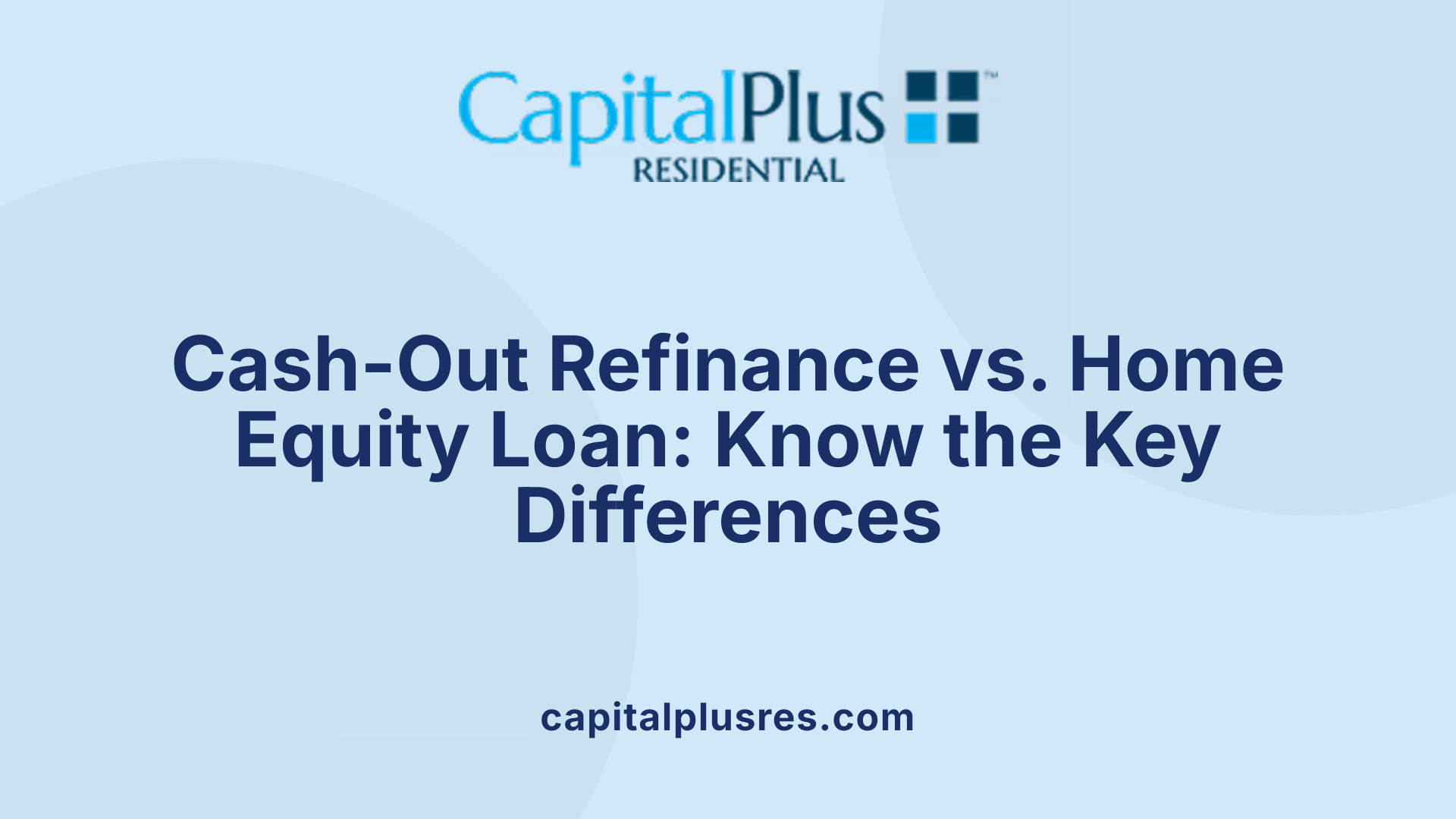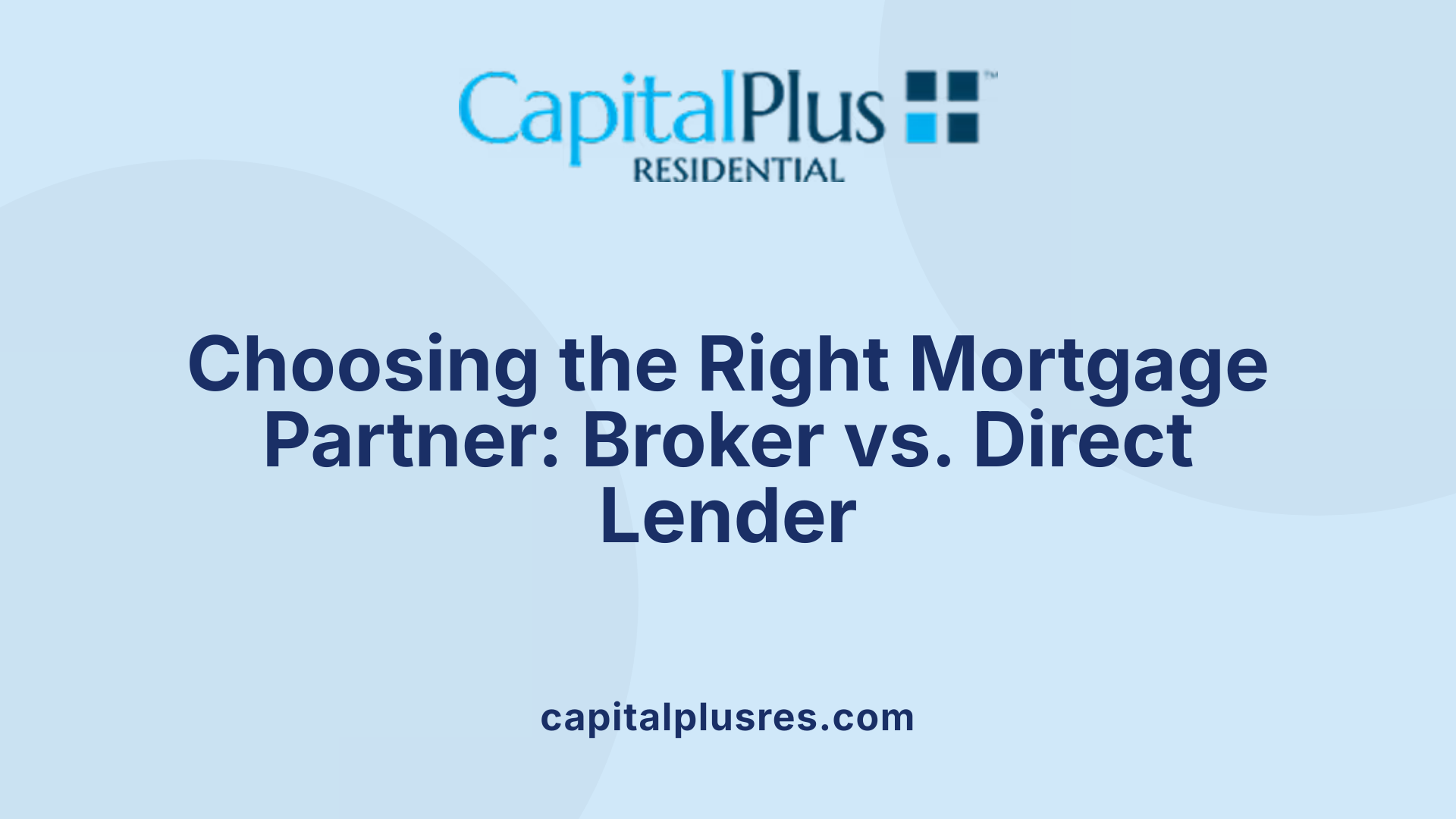Understanding Your Choices in Home Equity Financing
When homeowners need to tap into their property's value, two popular options emerge: a cash-out refinance and a home equity loan. While both leverage the equity built up in a home, their structures, costs, and ideal uses differ significantly. This article explores the distinctions between these two financial products to help you make an informed decision that aligns with your goals and financial situation.
What is a Cash-Out Refinance?

Definition of Cash-Out Refinance
A cash-out refinance is a mortgage transaction in which a homeowner replaces their existing mortgage with a new loan that is larger than the current outstanding balance. The difference between the new loan amount and the old mortgage is received as a lump sum in cash, allowing the homeowner to tap into the equity they have built in their home.
How It Replaces the Existing Mortgage
Unlike home equity loans or lines of credit that exist alongside an original mortgage, a cash-out refinance pays off the current mortgage entirely and replaces it with the new, larger loan. This means the homeowner makes a single monthly payment under the terms of the new mortgage.
Loan-to-Value Limits
Lenders typically allow borrowers to cash out up to approximately 80% of the home's appraised value. This loan-to-value (LTV) ratio ensures that some equity remains in the home after refinancing, which protects both the borrower and lender.
Interest Rates and Payment Structure
Cash-out refinance loans usually offer interest rates comparable to purchase mortgages and tend to be lower than rates on home equity loans. These rates can be either fixed or adjustable, and the loan repayment is structured into monthly payments similar to a traditional mortgage.
Typical Use Cases
Homeowners often choose a cash-out refinance to consolidate higher-interest debts like credit cards or auto loans, fund significant home renovations, or cover major expenses such as college tuition or medical bills. It is also advantageous for those wishing to lower their mortgage interest rate while accessing a substantial sum of cash.
Overall, a cash-out refinance is suited for borrowers planning to stay in their home long-term, seeking to leverage their home equity efficiently while maintaining lower interest costs and simplified loan servicing.
Understanding Home Equity Loans

What is a Home Equity Loan?
A home equity loan is a type of loan that allows homeowners to borrow a lump sum of money using the equity in their home as collateral. This loan is distinct from the primary mortgage and is often referred to as a second mortgage.
Second Mortgage Status
Because it is a separate loan from your original mortgage, a home equity loan is considered a second mortgage. This means it is subordinate to your primary loan, and it carries its own repayment schedule and terms.
Fixed Interest Rates and Loan Terms
Home equity loans typically feature fixed interest rates, which means the payments remain constant throughout the life of the loan. Repayment terms are also fixed, giving borrowers predictable monthly payments until the loan is fully paid off.
Loan-to-Value Limits
Lenders usually allow homeowners to borrow up to 80-85% of the total value of their home, including any existing mortgage balance. This loan-to-value (LTV) limit ensures that some equity is retained in the property.
Typical Uses for Home Equity Loans
Homeowners often use home equity loans for specific purposes such as funding home improvements, making large purchases, or providing down payments on investment properties. Because of the fixed repayment structure, these loans suit borrowers with significant equity and stable financial plans.
Key Differences Between Cash-Out Refinance and Home Equity Loan

First Lien vs. Second Mortgage
A fundamental distinction between a cash-out refinance and a home equity loan lies in their lien status. A cash-out refinance replaces your existing mortgage with a new, larger first lien mortgage. This means it pays off your original loan while increasing the loan amount to provide extra cash. In contrast, a home equity loan is a second mortgage, separate from the primary mortgage, subordinate in claim repayment priority. This second mortgage often requires a separate repayment schedule.
Interest Rates Comparison
Typically, cash-out refinances come with lower interest rates compared to home equity loans. Since cash-out refinancing involves the first mortgage lien, lenders often offer rates comparable to purchase mortgages, which can be fixed or adjustable. Home equity loans usually have higher fixed interest rates due to their subordinate lien position. Furthermore, the interest rates on cash-out refinancing are generally more favorable for borrowers with strong credit histories.
Closing Costs
Closing costs for cash-out refinance loans range between 2% and 6% of the loan amount, which can be higher compared to home equity loans. Home equity loans generally have lower closing costs, often up to 5%, and straightforward processing since they don't replace the existing mortgage. Borrowers should factor in these upfront costs when choosing between the two.
Loan Repayment Structure
With a cash-out refinance, the original mortgage loan is replaced by a single new loan, resulting in one consolidated monthly payment. Meanwhile, a home equity loan functions as a second mortgage, requiring two separate payments each month — one for the original mortgage and another for the home equity loan.
Impact on Monthly Payments
Since cash-out refinancing consolidates your mortgage and adds cash-out funds into a single loan, monthly payments may increase or decrease based on the new loan terms and interest rates. Home equity loans add a fixed monthly payment on top of your existing mortgage payments, potentially increasing overall monthly expenses. Hence, borrowers should carefully consider their financial plans before choosing either option.
Financial Considerations: Costs, Interest Rates, and Loan Terms
Comparison of Closing Costs
Cash-out refinancing generally comes with higher closing costs compared to home equity loans. Borrowers can typically expect to pay between 2% to 6% of the loan amount in closing fees for a cash-out refinance. In contrast, home equity loans usually have lower upfront closing costs, often up to 5%, and home equity lines of credit (HELOCs) might even have minimal fees, sometimes no application or credit report charges.
Interest Rate Ranges
Interest rates on cash-out refinances tend to be comparable to purchase mortgages and are often lower than rates on home equity loans since cash-out refinancing is a first lien. These rates can be either fixed or adjustable. Meanwhile, home equity loans usually carry fixed interest rates that are somewhat higher than those for primary mortgages but still lower than unsecured debt rates like credit cards. HELOCs typically have variable rates, making them more flexible but potentially subject to change.
Loan-to-Value (LTV) Ratios
Lenders typically allow borrowing up to 80% to 85% of the home's appraised value when using home equity loans or cash-out refinancing. Borrowers must maintain at least 15% to 20% equity in their homes after the loan is secured. Cash-out refinancing is generally capped at an LTV of around 80%, while home equity loans and HELOCs may allow slightly higher combined LTVs, provided total borrowing stays within acceptable limits.
Impact of Credit Scores and Debt-to-Income Ratios
Qualifying for these loans depends significantly on creditworthiness. Cash-out refinancing generally requires a credit score of at least 620 and allows debt-to-income ratios up to about 43 to 50%. Home equity loans, however, often require higher credit scores, usually 660 or above, and stricter debt-to-income limits around 43% or less. Strong credit profiles often lead to better interest rates and loan terms.
Tax Deductibility of Interest
Both cash-out refinances and home equity loans can offer tax-deductible interest if borrowed funds are used for qualified home improvements or other IRS-approved purposes. It is important that taxpayers consult current tax regulations and possibly a financial advisor to ensure eligibility for these deductions.
Choosing Based on Your Financial Goals and Circumstances
Scenarios Favoring Cash-Out Refinance
Cash-out refinancing is ideal for homeowners seeking to consolidate existing mortgage debt or access a large sum of cash for major expenses like home renovations or debt repayment. This option replaces the existing mortgage with a new, larger loan, increasing total mortgage debt but often offering lower interest rates compared to second mortgages. It tends to be more cost-effective over the long term for those who plan to stay in their homes indefinitely.
When a Home Equity Loan Is Preferable
A home equity loan suits homeowners who want a lump sum loan separate from their primary mortgage. It is often used for specific projects like home improvements or down payments on investment properties. Since it does not affect the original mortgage interest rate, it can benefit those happy with their current mortgage terms or those who plan to sell their home in a shorter timeframe. Closing costs are usually lower, and the loan has a fixed interest rate with a set repayment schedule.
Considerations of Length of Homeownership
If you plan to stay in your home long-term, a cash-out refinance could provide benefits from lower interest rates and improved loan terms. Conversely, if you expect to move in a few years, a home equity loan or second mortgage may be preferable to avoid paying the closing costs associated with refinancing.
Effect on Total Mortgage Debt
Cash-out refinancing increases your overall primary mortgage balance, as it replaces your existing mortgage with a larger loan. A home equity loan adds a second, subordinate mortgage, creating two separate payment obligations but leaving your original mortgage intact.
Role of Credit Profile
Qualifying for a cash-out refinance typically requires a credit score of at least 620 and a debt-to-income ratio around 43–50%. Home equity loans generally demand a higher credit score, often 660 or above, and a lower debt-to-income ratio, reflecting their nature as second mortgages with separate terms.
Selecting between these two options requires a clear understanding of your financial goals, how long you plan to keep your home, your current mortgage terms, and your credit situation. Consulting with mortgage professionals can provide tailored advice based on your personal circumstances.
Role of Mortgage Brokerage and Residential Lending Services
What services do mortgage brokerages typically provide?
Mortgage brokerages serve as intermediaries between borrowers and lenders, offering a comprehensive suite of services. They connect clients to a broad range of lenders, including those that might not be publicly accessible, helping borrowers secure the most favorable mortgage rates and terms. Brokers assist throughout the loan process by pulling credit reports, verifying income and assets, organizing documentation, and submitting loan applications. Their expertise extends to advising clients on specialized loan products, such as non-QM loans, ensuring choices fit the borrower's financial situation.
How do residential lending services differ from mortgage brokerages?
Residential lending services primarily involve lenders that provide loans directly to homebuyers. Unlike mortgage brokers, who work with multiple lenders, residential lending services focus on their own loan products. This means less variety but often streamlined approvals. Brokers act independent of lenders to offer unbiased guidance, while residential lenders typically have fixed underwriting standards and rates tied to their institution.
What is involved in the loan application and approval process?
Mortgage brokers coordinate all aspects of the loan application. They gather necessary paperwork, evaluate borrower qualifications, and communicate with multiple lenders to find suitable options. The approval process includes credit checks, verification of income and debts, and assessing property value. Brokers help interpret loan terms and facilitate closing procedures, smoothing the path to loan approval.
What are the benefits of working with a mortgage broker?
Working with a broker offers access to multiple lenders and loan products not always available directly. This competitive access allows borrowers to compare offers, potentially lowering costs and improving terms. Brokers streamline the application, reduce paperwork complexity, and may negotiate on clients’ behalf. Their regulated status ensures they act with the borrower’s best interests in mind.
How do mortgage brokers access multiple lenders?
Mortgage brokers cultivate networks of preferred lenders, including banks, credit unions, and private entities. Through these relationships, they can submit loan applications to various institutions, widening loan options beyond what any single residential lender offers. This connectivity is a critical advantage for consumers seeking the best loan fit.
| Service Aspect | Mortgage Brokerage | Residential Lending Services | Description |
|---|---|---|---|
| Loan Options | Wide range, including niche markets | Limited to institution's products | Brokers access many lenders; residential lenders focus in-house |
| Application Assistance | Full-service, document prep and submission | Application processed directly by lender | Brokers guide through entire application process |
| Rate & Term Negotiation | Can negotiate on behalf of borrower | Fixed by lender policies | Brokers aim to secure favorable terms |
| Access to Lenders | Multiple lenders, including private & nontraditional | Single lender offering | Brokers provide variety; lenders offer own products |
| Regulatory Oversight | Regulated to prioritize borrower interests | Regulated as financial institutions | Broker’s fiduciary role differs from lenders |
Differences Between Mortgage Brokers and Direct Lenders
How do residential lending services differ from mortgage brokerage services?
Residential lending services are offered directly by financial institutions such as banks and credit unions. These institutions provide mortgage products, handle the loan approval process internally, and manage all aspects of the lending process themselves. Borrowers work directly with these lenders, who assess creditworthiness, approve loans, and fund the mortgage.
Mortgage brokers, on the other hand, act as intermediaries between borrowers and a variety of lenders. They do not loan money themselves but help borrowers compare and select mortgage options based on interest rates, fees, and terms from multiple lenders. Brokers streamline access to a wider loan portfolio, tailoring choices to the borrower's financial needs.
Comparison of loan portfolios
Direct lenders typically offer loan products limited to what their institution provides, which may include fixed-rate loans, adjustable-rate mortgages, and government-backed loans. Mortgage brokers can source loans from multiple lenders, resulting in a broader selection that often includes specialized or niche mortgage products not available from a single institution.
Approval and processing differences
With direct lenders, the application, underwriting, and approval processes are centralized and handled internally, potentially leading to faster decision-making. Mortgage brokers submit applications to the lender chosen and coordinate between parties but rely on the lender for final approval. Processing times may vary depending on the lender's efficiency.
Cost and convenience factors
Borrowers working with direct lenders may experience streamlined communication and fewer parties involved, which can reduce delays. However, loan terms and interest rates are limited to one institution’s offerings. Mortgage brokers might charge fees or commission, but offer a broader comparison, potentially saving money by finding better rates or terms.
Decision-making for borrowers
Choosing between a mortgage broker and a direct lender depends on borrower priorities. Those who prefer dealing directly with their lender and want a straightforward process might choose a direct lender. Borrowers seeking a wider variety of loan products and competitive shopping might benefit from a mortgage broker’s services.
| Aspect | Direct Lenders | Mortgage Brokers |
|---|---|---|
| Source of funds | Provides loan funds directly | Does not fund loans, sources from multiple lenders |
| Loan portfolio | Limited to institution's products | Access to many lenders and diverse loan options |
| Approval process | Internal underwriting and decision | Submits application to lender; approval external |
| Cost | Usually no broker fee; terms fixed by lender | Possible broker fees; compares multiple offers |
| Borrower interaction | Direct communication with lender | Communication with both broker and lender |
This understanding helps borrowers determine the best lending path to meet their financial needs and homeownership goals.
How to Choose Between a Mortgage Broker and a Direct Lender

What factors should consumers consider when choosing between working with a mortgage broker or going directly to a lender?
When deciding whether to work with a mortgage broker or a direct lender, consumers should start by evaluating the variety of loan options each can provide. Mortgage brokers act as intermediaries who access multiple lenders, increasing the chances of securing competitive rates and diverse loan products tailored to different financial goals. In contrast, direct lenders offer only their proprietary loan products, which might limit choices but often simplify the selection process.
Fees and commissions are also important considerations. Mortgage brokers typically charge commissions or additional fees for their services, which can increase the overall loan cost. Direct lenders may offer more straightforward pricing but also might have their own fees embedded in loan terms. Understanding these costs upfront is essential to making an informed decision.
Convenience and personalized service vary between the two options. Brokers often provide hands-on assistance with paperwork, credit checks, and navigating the mortgage process, helping to guide borrowers through complex paperwork. Direct lenders might make loan approval faster due to streamlined internal processes and direct access to underwriting.
Potential speed of loan approval is another aspect to weigh. Direct lenders can sometimes approve loans more quickly since they control the entire process in-house, whereas brokers submit applications to third-party lenders that could have variable response times.
Ultimately, aligning the choice with one’s financial needs, credit profile, and desired loan terms is crucial. Those seeking a wide array of options and personalized guidance may prefer brokers, while borrowers focused on efficiency and direct communication might opt for direct lenders.
Comparing Cash-Out Refinance and Home Equity Loan with HELOC
How do cash-out refinance, home equity loans, and HELOCs differ in loan structure and interest rates?
A cash-out refinance replaces your existing mortgage with a new, larger loan that pays off the old mortgage and provides extra cash. It is a first lien loan, generally offering lower interest rates comparable to purchase mortgages, often fixed or adjustable. In contrast, a home equity loan is a second mortgage, separate from your primary mortgage, giving you a lump sum with a fixed interest rate typically higher than a first mortgage's rate. A home equity line of credit (HELOC), meanwhile, provides a revolving line of credit with a variable interest rate, often featuring a draw period where only interest may be paid.
Which option fits better for lump sum needs versus revolving credit?
Home equity loans and cash-out refinances are ideal for borrowers seeking a lump sum. Home equity loans offer a fixed monthly payment and set repayment term, suitable for a one-time large expense like home renovations or debt consolidation. Cash-out refinance likewise provides a lump sum but replaces your entire mortgage, beneficial for accessing significant cash and possibly lowering your interest rate. HELOCs excel for flexible, ongoing borrowing needs—they allow access to funds as needed during the draw period, ideal for projects with uncertain or phased costs.
How do closing costs and repayment terms compare?
Cash-out refinancing generally involves higher closing costs, roughly 2% to 6% of the loan amount, reflecting the mortgage replacement complexity. Home equity loans usually have lower closing costs, up to 5%, and offer fixed repayment terms. HELOCs often feature the lowest upfront costs (2% to 5%) and no application or credit report fees. Repayment terms vary: cash-out refinance repayments consolidate into a single mortgage payment, whereas home equity loans add a second monthly payment, and HELOC repayments can be interest-only during draws, switching to principal and interest later.
What are typical use cases for each option?
Cash-out refinance suits homeowners planning to stay long-term who want to reduce mortgage interest rates while accessing a large sum for home improvements or debt consolidation. Home equity loans work well for those wanting a fixed-rate loan for major purchases or projects without refinancing their primary mortgage. HELOCs are best for ongoing or unpredictable expenses, offering borrowing flexibility over time such as staggered home improvements or educational costs.
All these options let you borrow up to about 80% to 85% of your home’s value, keeping some equity intact, and may provide tax-deductible interest when the funds finance qualified home improvements.
Making the Right Choice for Your Home Equity Needs
Selecting between a cash-out refinance and a home equity loan depends on your financial priorities, length of homeownership, and how you intend to use the funds. Cash-out refinancing replaces your current mortgage with a new loan, often at a lower interest rate, and is suitable for consolidating debt or large expenses, though it comes with higher closing costs and a single monthly payment. Home equity loans, as second mortgages, offer fixed interest rates and typically lower upfront costs, making them ideal for specific lump-sum needs without altering your original mortgage. Understanding the roles of mortgage brokers and direct lenders further empowers you to navigate loan options effectively. Careful consideration of costs, interest rates, repayment terms, and your personal financial situation will help ensure you choose the most beneficial option for unlocking your home's potential.
References
- Cash-out refinance vs. home equity loan
- Cash-Out Refinances Vs. Home Equity Loans
- Home Lending: Refinancing, Cash-Out Refi & HELOC
- Cash-out refinance vs. home equity loans
- Cash-Out Refinance vs. Home Equity Loan
- Cash-out refinance vs. home equity loan: The differences
- Cash-Out Refinance vs. Home Equity Loan or HELOC
- Finance Home Improvements | Refinance Mortgage









